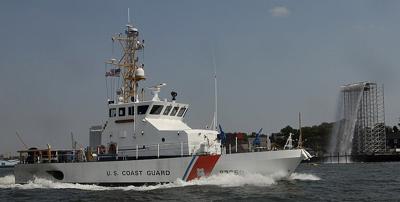The trouble aboard the Pop began Feb. 13.
After sailing almost 1,000 miles across the Caribbean Sea and Gulf of Mexico, from Honduras almost to coastal Louisiana, the ship’s voyage came to a halt when it guzzled its last gallon of fuel, leaving it adrift about 80 miles from Grand Isle and its crew and 24 passengers stranded at sea. They’d need to be resupplied if the Pop were to make it to its intended destination, CoCo Marina in Cocodrie, from where the passengers were to travel overland to a town in Assumption Parish.
Then a huge storm shuddered over the Gulf, almost capsizing the ship.
Soon, the U.S. Coast Guard learned of the Pop’s predicament, and launched a cutter to find it. But when the cutter arrived, it discovered not just a stranded vessel with an empty fuel tank; the passengers were foreigners who did not have permission to enter the United States, and the ship was carrying almost 53 pounds of cocaine, according to a newly released federal indictment.
Twice-bankrupt boat owner
The Justice Department announced the charges May 10: conspiracy to smuggle foreigners into the U.S. against the boat’s owner, Carl Allison, 46, and seven others, and drug smuggling against one of them. But it did not immediately release the indictment itself, which now provides a richer, more detailed account of the government’s case against Allison, a twice-bankrupt labor broker who lives in suburban Pittsburgh.
Along with the Pop and what the indictment says is a pier and safe house in Utila, Honduras, Allison owns Dynamic Capacity Group, an Irwin, Pennsylvania, corporation that purported to “recruit and train” employees from Latin America and supply them to U.S. factories. “As a veteran owned company,” its website read on May 13, before it was scrubbed of some of its content, “our goal is to show the US Government, that we support and love, a true path to providence, one that facilitates labor initiatives, tax initiatives, and resolves humanitarian issues and reduces crime.”
But according to the indictment, a shell company for Dynamic Capacity takes payments from foreigners who are then smuggled into the U.S., many of them to work at companies controlled by Allison.
Allison filed for bankruptcy protection from creditors in 2004, claiming $9,560 in assets and $46,722 in liabilities, according to public records. He returned to Bankruptcy Court in 2013, reporting $399,167 in assets and $666,266 in liabilities. Both cases were resolved within months of filing.
Dynamic Capacity Group was founded in 2018, according to public records.
Allison, his defense attorney and Dynamic Capacity did not respond to several requests for comment in recent days.
The tactics of 'Dr. Diablo'
In the indictment, the grand jury said Allison and his colleagues started planning their latest voyage in December, when they assembled the 24 foreigners and went over the rules for the trip. Before departing Honduras, the indictment says, Dynamic Capacity’s recruiting manager, Lindomar “Dr. Diablo” de la Rosa, 37, of Atlanta, confiscated the passenger’s mobile phones and wrapped them in aluminum foil to block their GPS signals and avoid detection by law enforcement.
When the Pop ran of fuel, the ship's captain, Darrell “Dee” Martinez, 40, a Honduran who had conducted several international voyages on behalf of Allison, and who has the letters “DCG” tattooed on his wrist, hatched a plan to haul 600 more gallons of fuel out to the drifting vessel via a private charter boat, according to the indictment. He used a satellite phone to call De La Rosa, who then enlisted Alex Flores-Villeda, 35, another Dynamic Capacity employee who lived in a Georgia rental house owned by De La Rosa.
Flores-Villeda drove a 1999 Dodge passenger van, registered to Allison, more than 500 miles from Atlanta to Cocodrie. The van, according to the indictment, had been intended to be used to take the ship’s passengers from CoCo Marina to a safe house in Paincourtville, controlled by Lance Vroon, 39, the ship captain’s brother-in-law.
But that never happened.
Intercepted at sea
On Feb. 14, Flores-Villeda chartered a boat and bought 600 gallons of extra fuel at CoCo Marina, using De La Rosa’s American Express card. On the same day, the Coast Guard cutter Tiger Shark departed Grand Isle and located the Pop.
As the charter boat approached the stranded Pop, the Tiger Shark intercepted it. While the guardsmen checked out the charter, the indictment says, Martinez met with his crew and 24 passengers on the Pop. The passengers were told to lie about why they were aboard the ship, and that someone would “hurt their families” if they didn’t stick to the story, according to the indictment.
The Coast Guard soon discovered the passengers aboard the Pop. The Tiger Shark towed the Pop to Grand Isle on Feb. 15, and all onboard were taken into custody by various federal agencies as they disembarked the ship.
Authorities found the cocaine later while searching the Pop.
On April 22, a federal grand jury in New Orleans secretly indicted Allison, De La Rosa, Martinez, Flores-Villeda and Vroon, along with Pop crew members Lenny Cooper, 39, Devon Cooper, 26, and Rudy Jackson Hernandez, 35. Authorities unsealed the indictment May 10, after Allison was arrested in Pennsylvania and de la Rosa was arrested in Georgia.
Spokespersons for the U.S. attorney’s office in New Orleans and the Coast Guard would not provide more information on the case. Sarah Loicano, a spokesperson for the U.S. Immigration and Customs Enforcement agency, said she could not provide more information about the status or whereabouts of the Pop’s 24 passengers without their names, which have not been made public.


